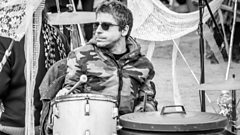Deaf Awareness Week
Deaf Academy teacher Nikki James shares her thoughts on why this week matters so much
Hi, my name is Nikki, Nikki James, and I work here at the Deaf Academy. I'm a HLTA, that's Higher Level Teaching Assistant. I am a deaf lady, a young deaf lady. And obviously you're thinking, this is a deaf woman, she's having an interview on the radio, where is this voice coming from? Well, I've got an interpreter here with me today, and that means the interpreter is using her voice. I'm signing, and she's using her voice. Very lucky, we've got a female interpreter today, could have been worse, we could have had a man so you'd have had a male voice for me today.
Deaf awareness is really, really important, and the reason is because the deaf community is a very small minority group, and hearing people tend to think of deaf people as old people, but there are so many young people that are sign language users. There's a lot of deaf people that don't have sign language, but it's thinking about how to engage with those deaf people that do use sign language as their first language. So for example, thinking about the hearing world, deaf people have to behave like hearing people and fit in with the hearing culture, and we feel that hearing people sometimes are missing out, because we have to just try and fit in with hearing people, and that makes a huge struggle in life for most deaf people. We feel like we're drowning a lot of the time, so it's really important for hearing people to understand about deaf culture and be deaf aware, and that it's not really so much about empowering, but making it equal. It's thinking about how we can engage with the hearing community as the minority deaf community.
I've got frustrations. There's so many small little things that can happen. For example, people say, oh, I'll tell you about that later. And I feel like, well, no, but then I have to come to you later and go, what were you talking about earlier? And they're like, oh, I can't even remember now. You know, it doesn't make you feel included when people do that. That's so frustrating. And sometimes people try too hard. So for example, you know, I appreciate that they do, but at the same time, it does make me feel a little bit small, like people looking at me, being really patronizing to me because I'm deaf and they sort of over-exaggerate. And if someone's trying too hard, it's almost making me feel that they think I am different and lower than them. You don't need to try really hard. You just need to accept me and treat me as an equal, and then we can bond really easily.
And I think another thing, I think a lot of deaf people out there, you know, they just feel nobody's learning sign language. They gesture with us, they try their best. We're happy to slow down and interact with people. And I'm really sorry to say this, but Makaton. It's like, no, no, thank you. Makaton is not an language. It's a linguistic tool, and it works in certain situations really well, but it's not a language. Makaton is not a language for the deaf community. BSL, British Sign Language is a full and rich and beautiful, amazing language. It's such a powerful language. And if we can change the view of hearing people to realize that Makaton is a linguistic tool for learning, it is not a language like British Sign Language. It's a really important difference.
I live in Ottery St. Mary. They have a shop. They'd probably be really happy to hear this, actually. And the people there, when we go shopping, they always try to sign thank you to me, or hello. Just one sign. It makes my day. It makes such a difference for me, going into my local shop and those being able to sign those small words to me, it just means so much to me. And it's like, you've seen me, you can see me, you know, it's not you're not seeing me as a deaf person or a disabled person. You're seeing me as an equal person. You're saying good morning to me or hello, or thank you. You're not looking down at me, you're just looking at me as a person that comes into this shop. You've seen me and it makes me feel so equal.
At the academy here, they have the college students and they're doing deaf awareness training. So they're going out and meeting people within the hearing community who don't know anything about deafness. And students go in to sometimes their workplace, and they teach them about deaf awareness. And it makes those young people feel so included and important. And obviously for the older deaf people, it's slightly different. Obviously, I'm a younger deaf person, but for the older people, you know, it's passing things down through the generations, isn't it? Thinking of the older people, going down to the younger people and building those relationships between everyone. Tiny changes can have a huge impact for deaf people, and in time we will get there. Thinking about my generation, when I grew up, it was so different, even just back then. And now the world is improving, but we can still definitely do more.
Duration:
This clip is from
More clips from 08/05/2024
-
![]()
Deaf Awareness Week - tip 1 for the hearing world
Duration: 01:18
More clips from Caroline Densley
-
![]()
'I was in denial this was happening to me'
Duration: 07:51
-
![]()
The Turning Tides Project at 10 - Choice
Duration: 03:48
-
![]()
The Turning Tides Project at 10 - Change
Duration: 03:05
-
![]()
The Turning Tides Project at 10 - Reflection
Duration: 03:00







